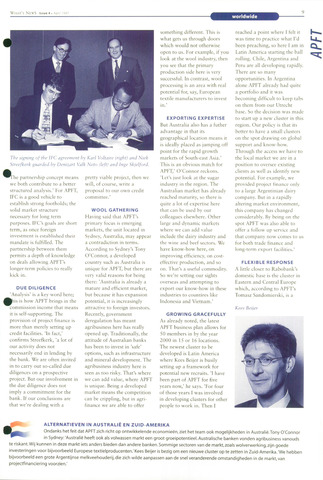WHAT'S NEWS Issue 4 April 1997
worldwide
9
The signing of the IFC agreement by Karl Voltaire (right) and Niek
Streefkerk guarded by Denizart Valk Neto (left) and Inge Skjelford.
^The partnership concept means
we both contribute to a better
structured analysis.' For APFT,
IFC is a good vehicle to
establish strong footholds; the
solid market structure
necessary for long term
purposes. IFC's goals are short
term, as once foreign
investment is established their
mandate is fulfilled. The
partnership between them
permits a depth of knowledge
on deals allowing APFT's
longer-term policies to really
kick in.
DUE DILIGENCE
'Analysis' is a key word here;
^his is how APFT brings in the
commission income that means
it is self-supporting. The
provision of project finance is
more than merely setting up
credit facilities. 'In fact,'
confirms Streefkerk, 'a lot of
our activity does not
necessarily end in lending by
the bank. We are often invited
in to carry out so-called due
diligences on a prospective
project. But our involvement in
the due diligence does not
imply a commitment for the
bank. If our conclusions are
that we're dealing with a
pretty viable project, then we
will, of course, write a
proposal to our own credit
committee.'
WOOL GATHERING
Having said that APFT's
primary focus is emerging
markets, the unit located in
Sydney, Australia, may appear
a contradiction in terms.
According to Sydney's Tony
O'Connor, a developed
country such as Australia is
unique for APFT, but there are
very valid reasons for being
there: 'Australia is already a
mature and efficiënt market,
but because it has expansion
potential, it is increasingly
attractive to foreign investors.
Recently, government
deregulation has meant
agribusiness here has really
opened up. Traditionally, the
attitude of Australian banks
has been to invest in 'safe'
options, such as infrastructure
and mineral development. The
agribusiness industry here is
seen as too risky. That's where
we can add value, where APFT
is unique. Being a developed
market means the competition
can be crippling, but in agri-
finance we are able to offer
something different. This is
what gets us through doors
which would not otherwise
open to us. For example, if you
look at the wool industry, then
you see that the primary
production side here is very
successful. In contrast, wool
processing is an area with real
potential for, say, European
textile manufacturers to invest
in.'
EXPORTING EXPERTISE
But Australia also has a futher
advantage in that its
geographical location means it
is ideally placed as jumping off
point for the rapid growth
markets of South-east Asia.'
This is an obvious match for
APFT,' O'Connor reckons.
'Let's just look at the sugar
industry in the region. The
Australian market has already
reached maturity, so there is
quite a lot of expertise here
that can be used by our
colleagues elsewhere. Other
large and dynamic markets
where we can add value
include the dairy industry and
the wine and beef sectors. We
have know-how here, on
improving efficiency, on cost-
effective production, and so
on. That's a useful commodity.
So we're setting our sights
overseas and attempting to
export our know-how in these
industries to countires like
Indonesia and Vietnam.'
GROWING GRACEFULLY
As already noted, the latest
APFT business plan allows for
50 members in by the year
2000 in 15 or 16 locations.
The newest cluster to be
developed is Latin America
where Kees Beijer is busily
setting up a framework for
potential new recruits. 'I have
been part of APFT for five
years now,' he says. 'For four
of those years I was involved
in developing clusters for other
people to work in. Then I
reached a point where I feit it
was time to practice what I'd
been preaching, so here I am in
Latin America starting the ball
rolling. Chile, Argentina and
Peru are all developing rapidly.
There are so many
opportunities. In Argentina
alone APFT already had quite
a portfolio and it was
becoming difficult to keep tabs
on them from our Utrecht
base. So the decision was made
to start up a new cluster in this
region. Our policy is that its
better to have a small clusters
on the spot drawing on global
support and know-how.
Through the access we have to
the local market we are in a
position to oversee existing
clients as well as identify new
potential. For example, we
provided project finance only
to a large Argentinian dairy
company. But in a rapidly
altering market environment,
this company has changed
considerably. By being on the
spot APFT was also able to
offer a follow up service and
that company now comes to us
for both trade finance and
long-term export facilities.'
FLEXIBLE RESPONSE
A little closer to Rabobank's
domestic base is the cluster in
Eastern and Central Europe
which, according to APFT's
Tomasz Sandomierski, is a
Kees Beijer
W ALTERNATIEVEN IN AUSTRALIË EN ZUID-AMERIKA
Ondanks het feit dat APFT zich richt op ontwikkelende economieën, ziet het team ook mogelijkheden in Australië.Tony O'Connor
in Sydney: 'Australië heeft ook als volwassen markt een groot groeipotentieel. Australische banken vonden agribusiness vanouds
te riskant.Wij kunnen in deze markt iets anders bieden dan andere banken. Sommige sectoren van de markt,zoals wolverwerking,zijn goede
investeringen voor bijvoorbeeld Europese textielproducenten.' Kees Beijer is bezig om een nieuwe cluster op te zetten in Zuid-Amerika. 'We hebben
bijvoorbeeld een grote Argentijnse melkveehouderij, die zich wilde aanpassen aan de snel veranderende omstandigheden in de markt, van
projectfinanciering voorzien.'

